
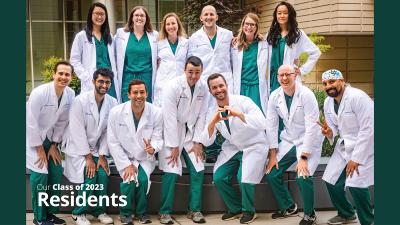
RESIDENCY RECAP
Resident Spotlight
Dr. Allison Apfel | CA-2
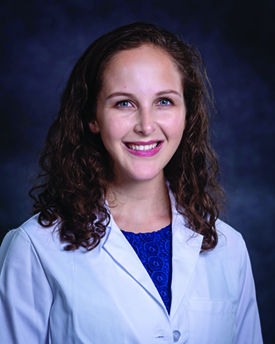
I tell people that my journey to Duke was a slow and steady journey eastward - starting in California where I grew up and attended college. Then I was off to Wisconsin for four years of not just learning medicine, but attempting to tolerate the cold and like the Packers. This all led to a place that I now consider home. I came into medical school unsure of what my path would ultimately be. However, I knew that I was entering a field where I would have the privilege of connecting with people in their most vulnerable of moments. I found anesthesiology rather serendipitously and found it to be the perfect mix of all the aspects of medicine I enjoyed, with high acuity, thoughtful medical management and procedures. The relationships you forge in anesthesiology are brief, intense and important, and I cherish the ability to be there for patients at a time when they may be at their most vulnerable.
I feel incredibly lucky to train at Duke, to say the very least. The acuity and breadth of cases is unmatched. The faculty make great role models, and I aspire to emulate them as I start my training. It’s also inspiring to be at an institution that is at the forefront of so many different aspects of the field, from research to perioperative medicine.
On a more personal level, I have felt a level of support here that I never could have imagined possible from a residency program. Residency is challenging, and with good reason. We are training to be exemplary physicians that can make the right decisions for patient care. Residency is also hard, however, because “life” still happens in the midst of the challenges of training. I feel lucky to be at a program where I know from first-hand experience that my co-residents, faculty and administration truly care about me and each other. Our department has a saying of “what we do changes lives,” and I can say with certainty that this program has changed mine.
Dr. Fintan Hughes | CA-3
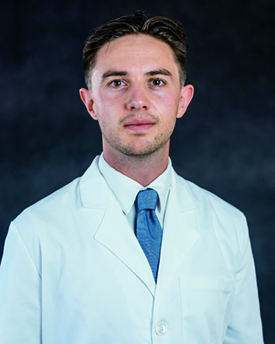
Studying medicine at the National University of Ireland, Galway, I remember thinking that the anesthetists always seemed like the coolest people in the hospital. They thought about the nuts and bolts of acute illness with problem solving style that appealed to my background in physics. But it was during research electives with the Xtreme Everest group at University College London that my path really started to cross with the world of anesthesia and perioperative medicine.
After that summer in London, spent crashing anesthesia conferences as a student, it seemed that Duke’s name was synonymous with modern anesthesia. From this point on, I realized that coming to the US for residency would provide unparalleled training. As a PGY3, having worked as house staff in Dublin and London hospitals, I jumped ship and came to Duke. The journey itself was surreal; the COVID lockdowns in Dublin stopped us traveling more than two kilometers from home for most of the spring and now I was packing my bike and kitesurfing gear onto a flight.
From my first days at Duke, I was struck by the passion and inquisitive approach of the staff here in both the clinical and research settings. At Duke, it is possible to find an expert in any field; this creates an incredible environment to develop as a clinician-scientist. The CAPER research group welcomed me into their world and have been an immense support during my time here. Together, we formed a research team with collaborators across the university and internationally, including Duke National University Singapore. This team has now been supported by the Duke Climate + Health initiative, demonstrating the university’s and health system’s innovative and forward facing approach. My biggest clinical takeaway so far has been learning to identify challenging cases and trusting my training when they arise.
The residency program here keeps us all on a consistently steep learning curve, creating a culture of continuous growth in which we all progress together. Whether it’s in the hospital, biking in the mountains, kitesurfing off the Outer Banks, or playing music together, the experiences I’ve had with the residents and faculty speak to the unique environment that the people at Duke create.
Alumni Shoutout
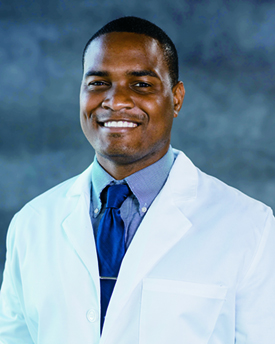
Savion Johnson, MD ’22
Pain Management, St. Luke’s Hospital
How has your training accelerated your practice of anesthesiology?
The fast-paced nature of the OR environment at Duke prepared me well. I am grateful for faculty who allowed me to be hands on with both bread and butter and advanced pain procedures as a resident, which allowed me to hit the ground running as a fellow. And, the robust and cutting-edge regional anesthesiology experience at Duke allowed me to be very comfortable with ultrasound-guided procedures and bring new skills to my hospital.
How did your training prepare you for being an anesthesiologist in a pandemic?
Duke’s stance on protecting residents during the peak of the pandemic is something that really stands out to me in hindsight. Most places are not as protective of their residents, and you see the difference when residents are the primary workforce compared to greater collaboration between CRNAs and residents that is seen at Duke. You can tell a lot about the leadership of the department during crisis, and I am thankful that I was able to train in a department run by Drs. Joseph Mathew and Annemarie Thompson and others, who truly made me feel seen and appreciated throughout the pandemic and beyond.
What are your greatest lessons from the Duke Anesthesiology Residency Program?
You do not have to change who you are and what you value in order to accomplish your goals. I was intimidated by the perceived faster pace and personality differences of those in the northeast compared to the south. I remember being told that I don’t have to change my personality to fit in; that discussion made a world of difference as I have seen those words come to fruition, and I realize that something that could be seen as a deficit in a certain environment can actually be what sets you apart. Additionally, Duke does an amazing job in building well-rounded anesthesiologists. The robust research arm, the clinical volume, paired with great faculty teaching is second to none, and I think it molds residents who can hold their own in those respects wherever they go.
What do you miss the most about Duke/Duke Anesthesiology?
The camaraderie amongst residents, fellows and faculty. To train in an environment with such great leaders in the field and brilliant peers who are incredibly humble was such a blessing, and I am incredibly grateful for that. More so Durham related, I also miss Mkokko Ramen.
Why anesthesiology?
While to us, the day-to-day events that encompass the practice of anesthesiology become very routine, for the patients, oftentimes they are presenting for a surgery that will change their lives, so being able to care for them in this most vulnerable time is a great privilege. I chose pain as a subspecialty because of its interventional nature and being able to utilize procedural skills to impact patients’ lives and function. Pain is debilitating for so many people and there are so many psychological, physiologic and social aspects that influence pain. I have found great joy and purpose working with this population of patients.
What keeps you going?
What keeps me going is when I think back to my senior year in high school, sharing a two-bedroom apartment with eight other people, trying to limit any distractions and achieve my dream of getting into Duke University; when I visit my mom in rural Virginia and wanting to get into a position to do more for her; thinking about all the tears shed after visiting my brother in prison for the majority of my teenage and adult life. Residency is extremely challenging. Fellowship is hard. Medicine in general can be incredibly exhausting, but given some of the things I have overcome, it keeps things in perspective. I am very privileged to be able to take care of patients every day, and I am incredibly grateful for Duke Anesthesiology for allowing me an opportunity to change my family’s life.
Advice for incoming/current residents?
Take full advantage of all the opportunities afforded to you. From the clinical opportunities, to research, to global health, Duke really is a unicorn of an anesthesiology program. Now that I have graduated and have had the opportunity to see how things are done elsewhere, I have an even greater appreciation for my experience at Duke. The opportunities to grow as an anesthesiologist and a human are endless in this department.
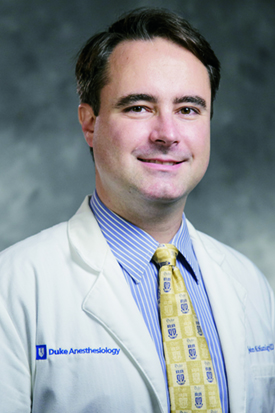
John McManigle, Jr., MD ‘20
Pediatrics, Duke University Hospital
What was the draw to become a faculty member of Duke Anesthesiology?
For me, the draw is the same as it was as a trainee – this is a department that believes in constant innovation in its clinical, research and educational missions, and backs that belief up with an investment of time and energy to help each team member identify and pursue their career goals. I was able to begin that journey as a resident in the ACES Program, with world-class mentoring and resources for my research projects. And as a faculty member, I’m lucky enough to continue that journey with further mentoring and investment in my development in innovation and technology alongside the clinical mission.
How did your training prepare you for being an anesthesiologist in a pandemic?
Core to an anesthesiologist’s practice is flexibility and working with the resources available. Going through the CA-3 year at the beginning of the COVID-19 pandemic, my class learned to take each day as it came. Some days brought lots of cases requiring prioritization, others brought ICU airways with best-available protective equipment, others brought emergency cases in patients with uncertain clinical status. Our faculty modeled decision making under pressure, and our residency class is now taking those lessons forward into a health care environment where pandemic effects linger and new challenges are always on the horizon.
What are your greatest lessons from the Duke Anesthesiology Residency Program?
The program provided the opportunity to get to know role models who are innovating in anesthesiology, critical care medicine and pain medicine in truly profound ways. One of the best features of our program is seeing how faculty approach the same clinical situation with different strategies. We as trainees could draw on that variety to build our own approaches to clinical problems. But the biggest lesson I hope to carry forward in medicine and in life is that there will always be more styles to learn. I hope to keep an open mind going forward in practice and in life, and never be afraid to learn a new technique or explore a new viewpoint.
What is your fondest memory of residency?
I remember being a fresh CA-1 doing big cases under the watchful supervision of fantastic senior residents; it seemed like every time I was at risk of getting in over my head, one of them would miraculously appear and guide me on the next steps. My fondest memory of residency was being a senior resident on call a couple of years later and recognizing that same look of relief on junior residents’ faces when I stopped by their operating rooms to check on them. This residency program and the department really focus on giving people the tools and support to grow at every stage.
Why anesthesiology?
Anesthesiology is full of contradictions – we are focused experts in hemodynamics, airway management, and resuscitation, and yet we are generalists who care for the whole spectrum of a patient’s medical issues while they are in the perioperative world. We pride ourselves on the careful planning required to make every day in the operating room as boring as possible, and yet we are trained to guide catastrophic events to the best possible conclusions when plans fall apart. We base our practice on data, trials and mechanisms of action, but in the moment, anesthesia can be a very intuitive practice. I chose anesthesiology because I relish in these contradictory mindsets, and I take pride in quietly helping patients through some of the most difficult days of their lives.
Advice for graduating residents?
The perioperative arena, especially at a big center like Duke, has so many moving parts that you can be lulled into a sense of complacency and trust that all of the pieces will fall into place and the outcomes will follow, regardless of our actions or attention at any given moment. As anesthesiologists, it is imperative that we interrupt this complacency by considering the differential, even when the answer seems obvious, by listening to the patient’s concerns, even when we’ve done the same case hundreds of times, by stopping to engage in the time-out and by paying attention to the surgeons’ work. In an environment where it is easy to be passive, we need to make the effort to actively do right by our patients and our colleagues.
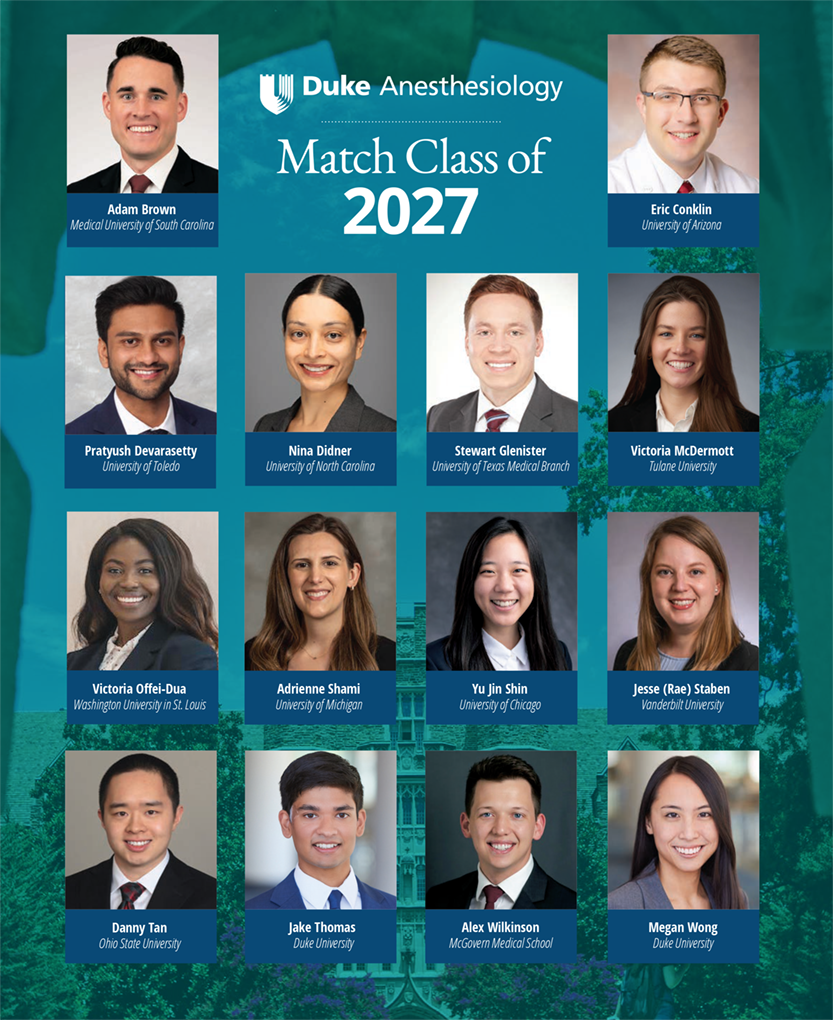

New & Noteworthy

Director, Residency Program
Interim Vice Chair for Education
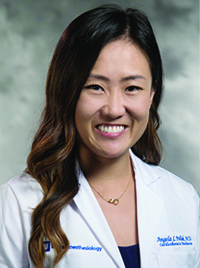
Assistant Director, Residency Program
Find us on Twitter!
Follow the Duke Anesthesiology Residency-Run Twitter Page and NEW Instagram Page
